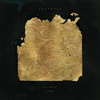Jacaszek, "Glimmer"
 Michal Jacaszek is one of the few contemporary composers around who is able to blend classical themes and instrumentation with digitized noise without sounding forced or unnatural.  It's a very distinctive aesthetic that he has been honing for a decade now and it seems to grow more refined with each new album.  Glimmer doesn't stylistically diverge at all from my expectations, but Jacaszek has made some definite improvements in building textural layers and balancing his characteristic gloom with some warmth and movement.  Those minor tweaks collectively make a big difference, as this might be his finest album yet.
Michal Jacaszek is one of the few contemporary composers around who is able to blend classical themes and instrumentation with digitized noise without sounding forced or unnatural.  It's a very distinctive aesthetic that he has been honing for a decade now and it seems to grow more refined with each new album.  Glimmer doesn't stylistically diverge at all from my expectations, but Jacaszek has made some definite improvements in building textural layers and balancing his characteristic gloom with some warmth and movement.  Those minor tweaks collectively make a big difference, as this might be his finest album yet.
One of the more perplexing problems in my life as a music lover is that I do not like the harpsichord at all, yet a number of great musicians use it for some of their best songs (Joanna Newsom, Colleen, etc.).  Jacascek goes one step further than most, however, as he makes it the very foundation of his sound here.  This puts him at a distinct disadvantage with me and my ears, but his instincts are mostly quite good.  Also, he makes very effective use of both clarinet and acoustic guitar, which helps.  He loses me a bit whenever he starts to approximate morose baroque chamber music, but the album's more abstract, ravaged, and creaking pieces are pretty stellar.  Ruin and decay might be Jacaszek's primary areas of expertise, actually: he seems to evoke them better than practically anyone else.  He is also quite adept at melancholy romanticism, which makes a striking combination.  When he is at his best, it sounds roughly like a zombie Bach and his undead friends are playing a forlorn concerto for the damned with rusted and cobweb-covered instruments.
Michael Gordon ventured into somewhat similar stylistic territory with his disturbing Decasia score, but he was much more aggressive and used teeth-rattlingly detuned instruments.  Jacaszek's work is far more subtle and listenable because he is able to maintain the illusion texturally while still remaining conventionally melodic instrumentally.  There are some great individual motifs strewn throughout Glimmer, like the melancholy overlapping clarinets in "Windhover," or the stuttering Spanish-tinged guitar at the beginning of "As Each Tucked String Tells," but Michal tends to shine brightest  in the shadows and periphery.
For me, the real beauty and genius of this album lies in its submerged-sounding swells, escalating hiss and crackle, odd creaks and echoes, reversed loops, and rare roars of noise.  In this regard, "Evening Strains to be Time's Vast" is probably Glimmer's single greatest piece, as it unfolds in an eerie, slow-burning backwards lurch beneath a languidly beautiful clarinet solo before erupting in a caustic squall of noise.  While that is definitely the album's harshest and most cathartic moment, its brilliant crescendo is not a fluke: Michal achieves a similar degree of roiling brilliance at the end of "Dare-gale."
Obviously, I still wish there was a lot less harpsichord on Glimmer (apologies to guest harpsichordist Margosia Skotnicka).  Personal prejudice aside, it is responsible for too many of the album's rare moments of obviousness or dubious nods to chamber music.  Also, I think Jacaszek errs on the side of sounding too much like a soundtrack composer sometimes.  Literally everything else about this album is wonderful though.  Jacaszek still has some room to grow as a composer, but his textural wizardry as a producer is unimpeachable and I absolutely love Andrzej Wojciechowski's beautifully nuanced clarinet playing.  And I can't fault Jacaszek's vision: he has certainly carved out an appealing niche that is uniquely his own, which is a rare thing.  For all its brooding, gloom, and neo-classicism, Glimmer is a remarkably singular, vibrant, and deep listening experience.
Samples:
 



